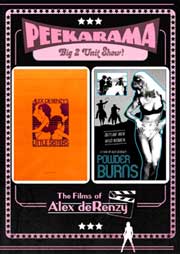 PEEKARAMA
BIG 2 UNIT SHOW!: LITTLE SISTERS (1972)/POWDER
BURNS (1971)
PEEKARAMA
BIG 2 UNIT SHOW!: LITTLE SISTERS (1972)/POWDER
BURNS (1971)Director: Alex de Renzy
Vinegar Syndrome
 PEEKARAMA
BIG 2 UNIT SHOW!: LITTLE SISTERS (1972)/POWDER
BURNS (1971)
PEEKARAMA
BIG 2 UNIT SHOW!: LITTLE SISTERS (1972)/POWDER
BURNS (1971)One of two Peekarama Big 2 Unit Show double bills this round gives us a pair of very early, deservedly obscure Alex de Renzy films.
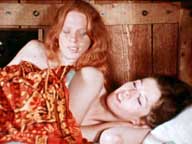
LITTLE SISTERS is a "hippy fairy tale" in which a Mother (who must have given birth at eight) and her two daughters Kandi (Kandi Johnson, BEHIND THE GREEN DOOR) and Emily (Clair Dia, DOCTOR DRACULA) in a caravan at the edge of the woods. Mother warns her daughters to stay out of the woods because of the dangers its holds for little girls. When Mother goes to the miller (a random Einstein look-alike), the girls do not have to disobey their mother since the danger comes to their doorstep in the form of a band of "pirates" lead by a hung captain (Tyler Reynolds, FEMMES DE SADE) and spirited away into the woods for gang rape. Despite the "fuck you" note ostensibly left by her missing children, Mother suspects that something is amiss but decides the culprits must be "The Dykes", a band of lesbians who lounge around an abandoned swimming pool battering each other with dildos. She is of course on the wrong track but inadvertently turns the leader on to the temptation of her two little girls and the lesbians wage war on the pirates. Meanwhile, Mother's search is waylaid by drag queens and gay monks (lead by CHINA DE SADE's Dale Meador) and her only hope may be the forest's guardian elf… Derek.
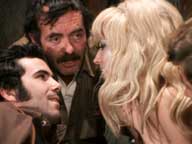 POWDER
BURNS (or POWDERBURNS EVER SO LIGHTLY as it appears onscreen) is described by
Vinegar Syndrome as a "meta-western". Sheriff Sham of Sewerpipe Creek
is resented by the locals when he runs the trio of McNasty brothers out of town
since they spend more money in one night than anyone else does in months. Since
he is also the bartender of the local saloon, he is also suffering from the
town's economic depression. When topless dancer Lolita – the "Golden
Dream" – arrives looking for a job (and reveals that the setting
is 1969 not a century earlier) by way of a striptease to a cover of "Tequila",
the Sheriff sees a moneymaking opportunity for himself – hiring on dancers
Schoolmarm Belle, Frizzyhead Lou, Piano Lil, and Anne Acid – and friends
Dude on the craps table and Kidd the Kid running a whorehouse. When the McNasty
brothers return to town, the Sham makes Dude the sheriff in a plan to use his
girls to fleece the brothers and then elect himself sheriff again in the morning
in order to collect on the reward for their capture.
POWDER
BURNS (or POWDERBURNS EVER SO LIGHTLY as it appears onscreen) is described by
Vinegar Syndrome as a "meta-western". Sheriff Sham of Sewerpipe Creek
is resented by the locals when he runs the trio of McNasty brothers out of town
since they spend more money in one night than anyone else does in months. Since
he is also the bartender of the local saloon, he is also suffering from the
town's economic depression. When topless dancer Lolita – the "Golden
Dream" – arrives looking for a job (and reveals that the setting
is 1969 not a century earlier) by way of a striptease to a cover of "Tequila",
the Sheriff sees a moneymaking opportunity for himself – hiring on dancers
Schoolmarm Belle, Frizzyhead Lou, Piano Lil, and Anne Acid – and friends
Dude on the craps table and Kidd the Kid running a whorehouse. When the McNasty
brothers return to town, the Sham makes Dude the sheriff in a plan to use his
girls to fleece the brothers and then elect himself sheriff again in the morning
in order to collect on the reward for their capture.
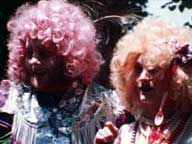
Neither of these films are your typical porn films, not as "golden age" features or as a stitched together series of loops. They find de Renzy experimenting with camera and technique more than anything (including sped up camera for supposed comic effect). His direction of actors and staging of action is completely non-existent (in the case of POWER BURNS, the sheriff interjects with narration at random points since the onscreen performers cannot get through any scenes conveying the intent of the scene). Both are a chore to get through, and it seems more often than not that the casts are just there to party in front of the camera. The extended gay orgy between the monks in LITTLE SISTERS suggests that de Renzy was less interested in the demands of the typical raincoat audience, although that and the straight and lesbian orgy scenes could also be illustrative of what Derek believes is corrupting the forest before he gets them all together to sing "America the Beautiful" and give each other hugs and flowers (either way, the sequences are covered with the same explicitude). While the two films are not that interesting in themselves, they hopefully suggest that we are going to see more of de Renzy's rarer films (I believe a release of some of his non-pornographic documentaries is in the works).
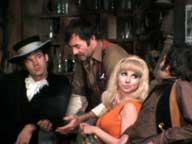 Vinegar
Syndrome's progressive, fullscreen transfers come from colorful but worn elements,
but it is unlikely we'll be seeing these in better condition… ever. LITTLE
SISTERS has no opening or end credits other than a title card and copyright
while POWER BURNS – which exhibits staining throughout the most of the
presentation – has end titles that credit the characters as themselves,
de Renzy as producer and director, and the film's obnoxious musical commentary
songs to a group called "Thought". The Dolby Digital 1.0 mono tracks
are better, although LITTLE SISTERS gets a bit warbly during a sex scene scored
with "Thus Spoke Zarathustra" (in which frame damage may have been
digitally covered more smoothly than the audio). There are no extras for either
film. (Eric
Cotenas)
Vinegar
Syndrome's progressive, fullscreen transfers come from colorful but worn elements,
but it is unlikely we'll be seeing these in better condition… ever. LITTLE
SISTERS has no opening or end credits other than a title card and copyright
while POWER BURNS – which exhibits staining throughout the most of the
presentation – has end titles that credit the characters as themselves,
de Renzy as producer and director, and the film's obnoxious musical commentary
songs to a group called "Thought". The Dolby Digital 1.0 mono tracks
are better, although LITTLE SISTERS gets a bit warbly during a sex scene scored
with "Thus Spoke Zarathustra" (in which frame damage may have been
digitally covered more smoothly than the audio). There are no extras for either
film. (Eric
Cotenas)